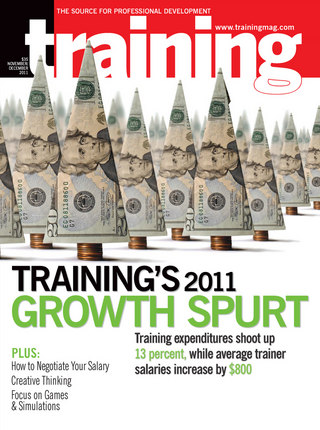Home November / December 2011
Training magazine Events: Reframing Possibility
By Tony O’Driscoll, Executive Director, Center for Technology, Entertainment and Media, Duke University’s Fuqua School of Business
To mark the 35th anniversary of the Training Conference & Expo, at Training 2012, our aspiration is a simple but audacious one: to take what we know about what works and what does not in driving human performance and to apply it in a way that allows everyone to achieve their utmost potential.
Growing Gains
Last month, I regretfully had to have a 70-foot-tall, stately maple tree removed from my front lawn. Unfortunately, it had fallen victim to a condition called girdling roots, in which the roots grew around the base of the trunk and choked off vital nutrients and water. A few weeks later, I noticed a hint of green peeking out from the mound of mulch. I cleared away the dirt and found a small sprout growing in the spot.
World View: Focus on Italy
By Lyrae Myxter, Director, Executive Services, Aperian Global
Once an agricultural society, Italy has developed into one of the world’s leading industrial economies since World War II. It ranks eighth in nominal GDP, is a member of the G8, and a founding member of the European Union.
How-To: Start a Corporate Mentoring Program
Starting a corporate mentoring program can seem like a huge task, and for that reason alone, many organizations simply don’t do it. They talk themselves out of it and rationalize that the “informal” mentoring taking place organically in the organization is enough. But it’s not.
Here are 10 tips to help you get your program off to a successful start:
Soapbox: The Case for Performance Support
A common misunderstanding of “informal learning” is that it can’t be intentionally designed, implemented, and measured. It can, in the form of Performance Support.
L3.0 Wrap-Up: The Next BIG Thing
Some 310 training professionals gathered at Training’s first Learning 3.0 Conference in Chicago last month to discover the industry’s next transformation and how it will affect their organizations. They heard from innovative thinkers on topics such as “When Games Invade Real Life and Gamify Work,” “Leveraging Social Media to Change the Enterprise,” “How the Brain Science of Attention Will Change the Way We Learn,” and “Cultivating the Imagination: Building Learning Environments for Innovation.”
Cox Enterprise: Computer-Driven Behavioral Simulation
By Margery Weinstein
When Cox Enterprise’s Cox Leadership Program (CLP) needed an action-learning simulation to support its curriculum, the company turned to PressTime, a computer-driven behavioral simulation created and distributed by Discovery Learning. After observing the simulation at a company in Canada, Susan Edwards, Cox’s business effectiveness and executive development consultant, decided it met the leadership program’s learning objectives.
AAA – The Auto Club Group: Simulating Good Customer Care
By Margery Weinstein
In an effort to continuously improve member service levels, AAA – The Auto Club Group faced a learning challenge: It needed a simulation that would address the specific service issues its customer-facing employees handle. The company decided the best way to meet this learning need was to develop its own custom simulation, says AAA – The Auto Club Group Vice President and Chief Learning Officer Daniel Hill.
Get Your Head in the Game
By Margery Weinstein
A changing mindset combined with changing technology is driving the use of games and simulations, says Karl M. Kapp, a learning and technology expert and professor of instructional technology at Bloomsburg University in Bloomsburg, PA. “People are becoming more open to using games and simulations for learning, and, at the same time, the technologies are making the development of games and simulations easier and faster than a mere five years ago.”
Salary Lessons from Wall St.
By Constance Melrose
Wall Street may not be fashionable in some circles, but here’s one statement that’s tough to dispute: Wall Street professionals know how to negotiate a good deal. Last year, even in relatively lean times, 56 percent of Wall Street financial pros reported earning a higher bonus than they earned the year before.


